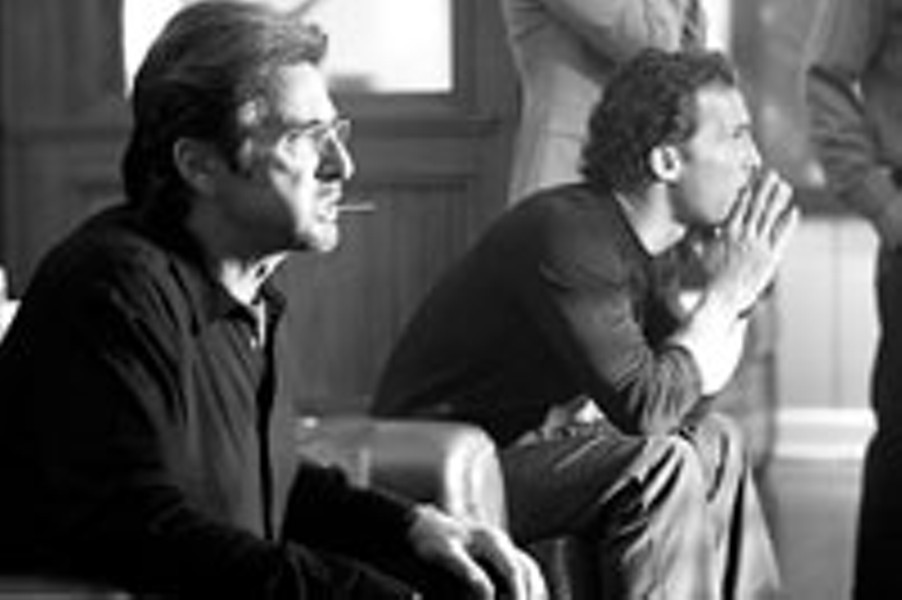Despite considerable evidence from the past century in cinema, the formulaic nature of the Hollywood approach to its subjects does not necessarily doom a movie to the usual slick pageant of stereotypical characters and situations, with appropriately shallow thought and emotion.
Innumerable works of art, both high and low, without descending into the hackneyed repetition of stale material from sterile imaginations, depend upon the comforting persistence of well known patterns and familiar people. Although the new film Two for the Money reveals its debts to several other movies, within that imitation it also displays an entertaining originality and attains a high degree of artistic success.
Its basic situation of a gifted young tyro undergoing instruction from a master of arcane arts recalls many fictional and cinematic narratives from the past. It initially resembles Wall Street, in which Michael Douglas tutored Charlie Sheen in the intricacies of the stock market and the value of greed. In starring Al Pacino as Walter Abrams, the teacher of Brandon Lang (Matthew McConaughey) it also resembles The Devil's Advocate, in which a Satanic Pacino corrupted Keanu Reeves. In its portrayal of the dangerous and destructive appeal of gambling it belongs with the two best cinematic studies of that particular addiction, Robert Altman's California Split and the more recent independent flick, Owning Mahowny.
McConaughey, who narrates the picture, plays a former college football star whose serious leg injury prevents him from succeeding in the pros. After bouncing from tryout to tryout, he works as a telemarketer in Las Vegas and dreams of making some sort of career in arena football or the Canadian league. A stroke of luck enables him to apply his knowledge of the game and his shrewdness as a handicapper to picking winning teams for callers who pay for the service. His success attracts the attention of Walter Abrams, who summons him to New York to work for his highly successful sports book, picking games, figuring point spreads, and predicting the total points scored in NFL games.
Christened with a new name by the boss and initiated into the subtleties of the business, Brandon rises rapidly, ascending from telephone pitchman to television tout on Abrams' weekly show. His phenomenal success earns him and Walter a great deal of money, and he begins to enjoy all the trappings of the good life in the big city; more important, he and Walter establish a relationship far beyond that of employer and employee. In the process of teaching Brandon the tricks of his trade, Walter makes his protégé a member of his family, turning him into the son he never had and becoming for Brandon a surrogate for the father who abandoned him in childhood.
As Brandon learns the methods and jargon of the business, the movie shows the fascinating workings of an organization that reaps profits, not from betting, but from advising bettors. As long as Brandon sustains his success predicting the weekly outcomes, he and Walter and his customers prosper, but when some emotional shocks turn him careless and sloppy, he comes to understand how the business ruins lives, including his own. He also finds himself in danger from a wealthy gangster who lost millions of dollars on his advice.
Within its portrayal of the relationship between the two men Two for the Money really serves as a kind of case study of addiction. Walter and his wife Toni (Rene Russo), for example, are addicts --- she's a former junkie and Walter a reformed gambler --- and the business itself depends on the compulsion of degenerate gamblers for its profits.
In a shocking and funny moment, Walter takes Brandon to a Gamblers Anonymous meeting, where he delivers an eloquent confession-lecture about their problem and his understanding of addiction, then hands out his business cards for any of the people who in effect fall off the wagon and need some good tips.
The greatest joy of Two for the Money, not surprisingly, originates in Al Pacino's brilliant impersonation of Walter Abrams, which simply dominates the movie. His series of brilliant set pieces, little essays on a number of subjects, including how to sell the service to a customer, how to work on television, and above all, on the nature of gambling itself, create a remarkable combination of comedy, irony, passion, and heartbreaking truths.
It's a bravura performance and nothing in the movie, however good, even approaches it in quality or effect, a truly amazing piece of acting.
Two for the Money(R), directed by D. J. Caruso, is playing at Canandaigua Theatres, Culver Ridge 16, Henrietta 18, Tinseltown USA.
